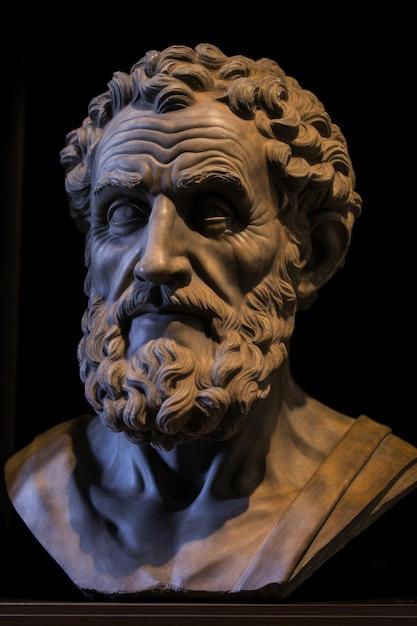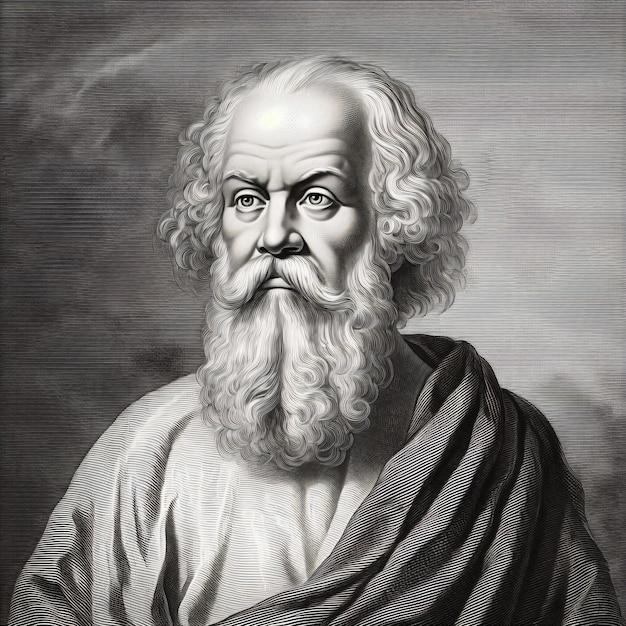Some of the greatest advancements in science come from the curiosity and intellect of individuals who lived hundreds or even thousands of years ago. One such influential figure was Democritus, an ancient Greek philosopher who lived around 460-370 BCE. Although modern science has made remarkable progress, Democritus’s contributions to our understanding of matter still hold their ground in the tapestry of scientific knowledge.
With the advent of technology and the remarkable progress we’ve made in unraveling the mysteries of the universe, it’s easy to forget the individuals who laid the groundwork for our present understanding. In this blog post, we’ll explore Democritus’s remarkable insights into the nature of matter, shedding light on his ideas that echo through the ages and continue to shape our modern understanding of the world around us.
Keywords: Democritus, understanding of matter, contributions, puzzle of matter, building blocks, universe

What Did Democritus Contribute to Our Modern Understanding of Matter
Democritus, the ancient Greek philosopher, made significant contributions to our modern understanding of matter. His ideas, although ancient, continue to shape our contemporary scientific knowledge. Let’s dive into Democritus’ intriguing insights and see how they have influenced the way we comprehend the building blocks of the universe.
Atomic Theory: Breaking It Down to the Smallest Bits
Democritus is credited with developing the concept of atomic theory, the notion that matter is composed of indivisible particles called atoms. The word “atom” originates from the Greek term “atomos,” meaning “uncuttable” or “indivisible.” Considering the limited technology of his time, Democritus’ hypothesis was remarkably astute.
According to Democritus, atoms are unchanging, homogeneous entities that combine and arrange themselves differently to create the myriad substances we encounter. These atoms possess specific shapes, sizes, and properties. They are in constant motion, interacting with each other and forming different combinations to give rise to various materials.
The Void: A Place for Atoms to Roam Free
Democritus also introduced the concept of the “void,” an empty space in which atoms move and interact. He believed that atoms are in a perpetual state of motion, colliding and rebounding off one another. The void allows for their unhindered movement, enabling the diverse forms of matter we observe.
The notion of the void was crucial because it explained why objects could pass through one another without obstructing their paths. Imagine trying to push your hand through a solid wall—without the concept of the void, it would be incomprehensible. Thanks to Democritus, we now understand that our physical world comprises both matter and empty space.
Infinite Divisibility: Chopping It Up Forever
Democritus proposed that atoms are indivisible, but he also acknowledged the potential for further subdivision into smaller particles. He reasoned that if atoms were truly indivisible, the world would consist of a limited number of substances. To account for the abundant variety of matter, he theorized that atoms could be broken down into smaller units called “minima.”
This idea of infinite divisibility, while not fully accurate, laid the groundwork for future discoveries in the field of particle physics. Modern scientific advancements have revealed the subatomic particles that make up atoms, such as protons, neutrons, and electrons, expanding upon Democritus’ initial ideas.
Democritus vs. Aristotle: A Battle of Philosophical Giants
Democritus’ atomic theory clashed with the ideas of another Greek philosopher, Aristotle. Aristotle advocated for the concept of “hyle,” suggesting that matter could be infinitely divided without limit. This eternal philosophical battle between Democritus and Aristotle highlights the contrasting viewpoints on the fundamental nature of matter.
It wasn’t until the 19th century that John Dalton’s work on atomic theory and subsequent scientific investigations confirmed the validity of Democritus’ ideas. This rekindled interest in atomism and paved the way for further scientific progress in understanding the intricacies of matter.
Democritus’ Enduring Legacy
Democritus’ contributions to our modern understanding of matter cannot be overstated. His groundbreaking ideas regarding atoms, the void, and infinite divisibility laid the foundation for the development of atomic theory. While some of his proposals have been refined and enhanced over time, we owe a debt of gratitude to Democritus for setting us on this path of scientific exploration.
As we continue to delve deeper into the mysteries of the universe, let’s remember the bold philosopher from ancient times who first proposed that everything is composed of tiny, indivisible building blocks. From Democritus’ grain of wisdom, a grand, modern understanding of matter has emerged.

FAQ: Democritus and the Modern Understanding of Matter
Why was Mendeleev’s periodic table not accepted
Mendeleev’s periodic table initially faced resistance and was not immediately accepted due to a few reasons:
-
Insufficient evidence: At the time, the scientific community did not have enough evidence to support Mendeleev’s theory of periodicity. Critics argued that the gaps in the periodic table were merely flaws in his system rather than indications of undiscovered elements.
-
Conflicting atomic weights: There were inconsistencies in the atomic weight measurements of certain elements, making it challenging to arrange them accurately in the periodic table. This led some scientists to question the validity of Mendeleev’s approach.
-
Lack of understanding: The fundamental concepts surrounding atoms and atomic structure were still evolving. Without a complete understanding of the inner workings of atoms, it was difficult for some scientists to fully grasp and accept Mendeleev’s contributions.
What did Democritus contribute to our modern understanding of matter
Democritus, an ancient Greek philosopher, made several crucial contributions to our modern understanding of matter:
-
Atomic theory: Democritus proposed that all matter is composed of indivisible particles called atoms. He believed that atoms are indestructible, immutable, and perpetually in motion. This concept laid the foundation for the development of modern atomic theory.
-
Void and motion: Democritus posited that atoms move in a void, which he referred to as the “void theory.” According to him, differences in the size, shape, and arrangement of atoms determine the properties and behavior of matter.
-
Infinite diversity: Democritus emphasized that atoms come in different sizes, shapes, and arrangements, leading to an infinite variety of matter in the universe. This idea influenced the concept of diverse chemical elements and their combinations.
Who was Dmitri Mendeleev and what contributions did he make to our understanding of the periodic table
Dmitri Mendeleev, a Russian chemist, revolutionized our understanding of chemical elements through his contributions to the periodic table:
-
Organization of elements: Mendeleev arranged the known elements based on their chemical properties and increasing atomic weights. His arrangement provided a systematic structure that revealed similarities and patterns among the elements.
-
Predictive power: Mendeleev left gaps in his periodic table when certain elements had not yet been discovered. However, he boldly predicted the existence and properties of these missing elements based on the trends and patterns he observed. Many of his predictions were later proven accurate.
-
Periodicity: Mendeleev’s periodic table demonstrated the periodicity of elements, showcasing recurring patterns in their properties. This paved the way for a deeper understanding of the underlying principles governing the behavior of elements.
Remember, both Democritus and Mendeleev played significant roles in shaping our understanding of matter and the intricate world of atoms and elements. Their theories and insights continue to inspire scientific progress in the field of chemistry to this day.
